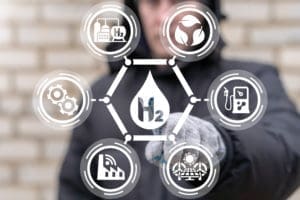Several states across the country are adopting goals to reduce harmful emissions into the atmosphere by reducing the amount of gasoline and diesel-powered vehicles on the road. The transportation industry is the leading cause of poor air quality because of the carbon dioxide (CO2) cars and trucks release into the atmosphere. One average consumer vehicle emits about 20 pounds of CO2 for every gallon of gasoline used–equivalent to between 6 and 9 tons of CO2 annually. Commercial fleet vehicles like tow trucks are responsible for more significant CO2 emissions. As a result, many commercial fleets, including towing businesses, are exploring options for using hydrogen fuel tow trucks to serve their customers.
 How does hydrogen fuel work?
How does hydrogen fuel work?
Hydrogen fuel-cell vehicles are powered by electricity, much like a battery. However, unlike battery-electric vehicles, the fuel cells are not recharged from an external power source. Instead, compressed hydrogen gas feeds into a fuel cell “stack” that transforms the hydrogen’s chemical energy into electrical energy. Hydrogen enters the anode of the cell stack and comes into contact with a catalyst that separates the hydrogen atoms into an electron and proton. The electrons are collected and used to power the vehicle’s circuitry. The only emission from a hydrogen fuel cell vehicle is water. Hydrogen fuel works well for commercial vehicles for a couple of reasons. First, it’s quick and easy to refill the tank. Hydrogen fuel is pumped into the vehicle, similar to gasoline or diesel, in about the same amount of time. Second, hydrogen fuel cell engines are strong and have enough horsepower to move heavy loads. Finally, hydrogen fuel cell engines are clean and easier to service than their diesel counterparts.
Colorado is introducing hydrogen fuel tow trucks to their roads.
In mid-2021, AAA Colorado announced it would add hydrogen fuel tow trucks to its fleet of emergency response vehicles. This marks the first wide-scale adoption of hydrogen fuel cell vehicles in the towing industry. According to AAA Colorado:
“All told, transportation is one of the largest sources of greenhouse gas emissions and other air pollutants in Colorado and across the country. Hydrogen infrastructure will play a critical role in reducing those emissions, especially in Colorado – where we’re lucky to have a consistent supply of green energy on our grids and where motorists regularly choose to drive all-weather, all-terrain vehicles across long distances.”
AAA Colorado will be producing the hydrogen fuel it needs for the fleet on-site and making excess hydrogen fuel available for sale to consumers.
Collins Manufacturing is your partner for long-term success.
Even as the landscape changes, we’ll be at your side to help your company achieve its goals. While you’re focused on running your business, allow our pros at Collins Manufacturing to introduce you to top-of-the-line towing equipment your employees and customers will love. Our Collins Manufacturing’s Hi-SpeedⓇ Dolly and Carrier Dolly systems are easy, safe to operate, light to transport, and durable to handle the toughest towing jobs. By providing our towing solutions for your employees, you’ll make their lives easier and see their job satisfaction grow. Collins has been an industry leader in towing equipment for over 45 years. Our Hi-SpeedⓇ Dolly and Carrier Dolly systems provide towing professionals with lightweight solutions durable enough to get even large vehicles out of challenging situations and transport them safely wherever they need to go. Our products are designed with safety first to keep your employees safe while attaching and moving vehicles. Visit our website or give us a call to learn more about our products.

Leave a Reply